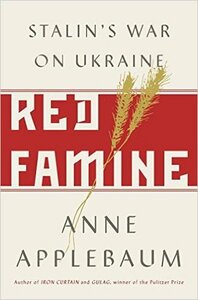Take a photo of a barcode or cover
adventurous
challenging
dark
emotional
hopeful
informative
reflective
sad
medium-paced
challenging
dark
informative
reflective
sad
medium-paced
challenging
dark
informative
medium-paced
challenging
dark
emotional
informative
reflective
sad
tense
fast-paced
"The first lesson which is becoming an integral part of Ukrainian consciousness is that Russia has never had and never will have any other interest in Ukraine beyond the total destruction of the Ukrainian nation." - Ivan Drach
The Russians through their well practiced and well oiled propaganda machines have been able to allow the world to fall into a lazy definition of what nationalism means - Americans, Russians, the French, and so on immediately think of the fascist powers that the world defeated 80 years ago. But that's not all of what nationalism is. As is portrayed throughout the novel, Ukrainian nationalism was not something spawned out of an expansionist, colonial power determined to be a power player on the world stage. It was spawned out of hope for people to rule themselves, and be free of whichever yoke they fell under. Which for Ukraine, was many, for a long period of time.
Utterly fantastic book, and I intend on reading far more Applebaum once my reading list clears up a tad. Incredible well documented and portrayed at every level. A few chapters in the book read worse than horror novels and kept me up at night. The imagery given by contemporary testimony is beyond haunting, just as is the list of petty actions committed by those who either felt compelled or were compelled by genocidal orders given from above.
Russia is genocide's most practiced student, especially at this point in history, and its experience shows. The ruin was complete, the guilt was avoided by all who committed the actions from the top to the bottom, and international condemnation was dodged thanks to "realpolitik". The Soviets depended on Nazi Germany for more than just Poland - using the rise of a fascist power in Europe allowed them to commit a genocide without being bothered by powers who otherwise would've acted against them.
Ще не вмерла України і слава, і воля. The glory and will of Ukraine has not yet perished.
The Russians through their well practiced and well oiled propaganda machines have been able to allow the world to fall into a lazy definition of what nationalism means - Americans, Russians, the French, and so on immediately think of the fascist powers that the world defeated 80 years ago. But that's not all of what nationalism is. As is portrayed throughout the novel, Ukrainian nationalism was not something spawned out of an expansionist, colonial power determined to be a power player on the world stage. It was spawned out of hope for people to rule themselves, and be free of whichever yoke they fell under. Which for Ukraine, was many, for a long period of time.
Utterly fantastic book, and I intend on reading far more Applebaum once my reading list clears up a tad. Incredible well documented and portrayed at every level. A few chapters in the book read worse than horror novels and kept me up at night. The imagery given by contemporary testimony is beyond haunting, just as is the list of petty actions committed by those who either felt compelled or were compelled by genocidal orders given from above.
Russia is genocide's most practiced student, especially at this point in history, and its experience shows. The ruin was complete, the guilt was avoided by all who committed the actions from the top to the bottom, and international condemnation was dodged thanks to "realpolitik". The Soviets depended on Nazi Germany for more than just Poland - using the rise of a fascist power in Europe allowed them to commit a genocide without being bothered by powers who otherwise would've acted against them.
Ще не вмерла України і слава, і воля. The glory and will of Ukraine has not yet perished.
challenging
dark
informative
sad
slow-paced
challenging
dark
emotional
informative
reflective
sad
medium-paced
As murderous as the Soviet leadership was, Applebaum depicts them as mustache twirling evil caricatures devoid of any nuance. She ignores serious questions of agricultural practice and policy (especially anything predating the Soviets) in favor of focusing on Russian racism towards Ukrainians. Obviously no serious person should ignore that racist hate, but acting like it was the only thing going on is a deliberate choice and I don’t care for it. Conquest’s book remains superior, even if Applebaum’s is easier to read or listen to.
Anne Applebaum to znana publicystka „The Washington Post”, prywatnie żona Radosława Sikorskiego, byłego polskiego ministra obrony narodowej i spraw zagranicznych. Powyższy tytuł jest szczegółowym podniesieniem tematu sztucznie wywołanej klęski Wielkiego Głodu na Ukrainie w latach 1931- 1934, będącego następstwem świadomych i okrutnych decyzji Józefa Stalina, skierowanych w ukraińskich chłopów.
W wyniku takiego postępowania, na terenach byłego Związku Radzieckiego zmarło z glodu co najmniej 5 milionów ludzi, z czego ponad 3,9 miliona Ukraińców. Kraj o którym mówiono, że jest "spichlerzem" Europy, staje się nagle gigantycznym cmentarzem.Osłabienie kwashiorkorem (niedożywienie białkowo- kaloryczne), liczne przypadki kanibalizmu, znieczulica względem śmierci, objawy psychozy, trup ścielący się gęsto na ulicach, kilometrowe kolejki za chlebem.... to nie są obrazy, które łatwo się czyta. To wstrząsające w swojej wymowie, obrazy o jeszcze jednej zbrodniczej strukturze myśli Stalina i jego komunistycznych wykonawców.
Imponująca baza źródłowa, z której korzystała autorka obejmuje wykorzystanie dokumentacji pochodzącej z licznych archiwów rosyjskich, ukraińskich i kanadyjskich, oraz spisanych wspomnień i ustnych relacji.Dość napisać, że bibliografia zajmuje w tej książce aż 20 końcowych stron (sic!) co świadczy o tytanicznej wręcz pracy autorki. I jakkolwiek to zabrzmi, pomimo przerażającej tematyki, książkę czyta się lekko ale to raczej zasługa głównie przystępnego stylu pisania autorki, co znacznie ułatwia czytanie o wyjątkowo tragicznej karcie ukraińskiej historii.
W wyniku takiego postępowania, na terenach byłego Związku Radzieckiego zmarło z glodu co najmniej 5 milionów ludzi, z czego ponad 3,9 miliona Ukraińców. Kraj o którym mówiono, że jest "spichlerzem" Europy, staje się nagle gigantycznym cmentarzem.Osłabienie kwashiorkorem (niedożywienie białkowo- kaloryczne), liczne przypadki kanibalizmu, znieczulica względem śmierci, objawy psychozy, trup ścielący się gęsto na ulicach, kilometrowe kolejki za chlebem.... to nie są obrazy, które łatwo się czyta. To wstrząsające w swojej wymowie, obrazy o jeszcze jednej zbrodniczej strukturze myśli Stalina i jego komunistycznych wykonawców.
Imponująca baza źródłowa, z której korzystała autorka obejmuje wykorzystanie dokumentacji pochodzącej z licznych archiwów rosyjskich, ukraińskich i kanadyjskich, oraz spisanych wspomnień i ustnych relacji.Dość napisać, że bibliografia zajmuje w tej książce aż 20 końcowych stron (sic!) co świadczy o tytanicznej wręcz pracy autorki. I jakkolwiek to zabrzmi, pomimo przerażającej tematyki, książkę czyta się lekko ale to raczej zasługa głównie przystępnego stylu pisania autorki, co znacznie ułatwia czytanie o wyjątkowo tragicznej karcie ukraińskiej historii.
challenging
dark
informative
sad
slow-paced




